As I write, the sun shines from a clear blue sky, the birds tweet like mad, it’s warm enough to sit short-sleeved on the roof terrace, the forecast having promised temperatures of up to 18 degrees Celsius: everything screams SPRING. Yet it is only mid-February, today is the last day of school before the winter break and children here would normally expect (or at least hope for) frost and snow. Indeed, there are bits left over from a snow storm less than two weeks ago that was heavy enough to ground planes for a day at our local airport. It’s truly weird – and so are my feelings about it. On the one hand I long for nothing more than the return of the sun, warmer days, flowers and green, the return of life. On the other I don’t feel ready for it just yet. It just doesn’t feel appropriate – and that, for me, is only in a very small way linked to the time of year.
Several personal crises have converged over the past months, some long-running, some more recent. The move back to Germany last summer has contributed, not least as I’ve lost not only my own beloved garden but also immediate access to Kew, always a source of comfort, and the network of people and friends for everyday moral support I had in London. You know, the heart-to-heart over a shared coffee, the chat with other mums in the playground whilst the children are running around… The situation with Brexit hasn't helped either. At the end of 2018, I mentally hit rock bottom.
The cat in the bag, the tree in the net...
Now, unlike in Britain many people in Germany will not put up the tree before actual Christmas, with Christmas Eve morning being the time to decorate it as this is the big and main day for us. So a week before that did not really seem too late to be buying a tree. Yet when I asked the lady at the till in the small petrol station nextdoor, she confirmed that indeed the sale here was over for this year. However, there were a few left-over trees the seller had left, readily netted for transport, leaning against the wall of the yard with bits of paper attached that told the suggested price people should pay for them and leave with her at the petrol station, for the seller to collect later. She assured me that the trees, grown regionally, were usually well-shaped and since I didn’t have much of an option (i.e. no car and no other point of sale anywhere nearby – this was just a tram stop from our place) we bought the cat in the bag, or more precisely the Christmas tree in the net.
Unlike other years, it was not a Nordmann fir (Abies nordmanniana) but a Blue Spruce (Picea pungens) and as I was lugging the 2.50 m tree home – the kids helping to carry it at the sawn-off end and the tip – it felt more like I was hugging a cactus, the needles sharp and stiff like a hedgehog’s spines. We got it home and upstairs and put it outside on the roof terrace of our flat for the remaining days. I didn’t see it as an omen but neither did it lift the mood when three days later in high winds and torrential rain the tree was toppled and fell – without much damage – despite being sheltered in the roof’s recess and screwed tight into the tree stand.
Not in Christmas spirits...
I could tell that the latest incident had been pretty bad, not least because my sister talked about it with such deliberate calm – meant to be reassuring but I can read between the lines. Precisely how bad I would only discover a few days later though. I found myself in a deep conflict: on the one hand I wanted to come straight away to be with my dad. On the other, I had my own children who looked forward to Christmas, not to mention some ill-health myself which eventually saw me spend the afternoon of Christmas Eve at A & E to be prescribed antibiotics, so I felt physically rotten on top of everything. Mum and my sister both said there was nothing I could do at the moment and that it made little sense for me to come straight away, especially with the extra risk of infecting already severely weakened Dad. He was stable, they said, but very tired and even had sent the two of them away during visiting hour in order to be able to get some rest.
In case you are wondering now: unlike for most Brits, Christmas does not self-evidently mean a big family gathering for us, even though we are very close. For various reasons, one being the very small flat my parents live in, another my dad’s health that prevented him from a 13hour journey with multiple changes between trains, plane and busses to our home in London, the last few Christmases we had spent separately, preferring to visit at other times of year.
On moving back to Germany I had looked forward to welcoming my parents to our new home which wasn’t just more spacious but a fairly straight-forward train ride away. Alas, that was not to be anymore. Even before the latest hospital admission there was little hope he’d ever come to see our place in person, certainly not in winter. Thus, when my own little family gathered under the Christmas tree this time, I sadly reflected on that missed opportunity in all our lives. And still I had no real idea how bad things were – or rather: how different to previous hospital admissions.
Coming home...
My sister picked me up at the train station and filled me in on the details they so far had kept from me. Namely, that on the 22nd my mum and sister had seriously feared Dad was to die before emergency crews would reach them. And then, once he was safely in hospital and mum and sis had been told they could go home, just a few hours later they were called back in as doctors thought Dad would soon take his last breath. They had then frantically consulted the train timetable, found there was no chance I’d make it there that night and therefore had decided against calling me at that very moment. As it turned out, Dad was not in quite such a bad state yet, the alarm was called off just two hours later, and by the time my sister had called me the following day he was not well but at least stable. Hearing all that I was doubly grateful I’d taken the train now…
On the day after my arrival he felt well enough to get dressed and sit in the living room, enjoying once more the sight of a Christmas tree and the two of us quietly sharing happy memories as it had been me and him who usually dressed – and later as painstakingly undressed – the Christmas tree when I was a child. It had been the same decoration then as it was now: simple red baubles, still reminiscent of the red apples they originally symbolized, electric candles rather than fairy lights, handmade straw stars. The only difference was the lack of tinsel now. Back in the day we had tinsel made of lead foil which was hung strand by strand on the branches until the whole tree looked like it was covered in a veil of silver. It had to be taken down in the same laborious way, too: gathered over one hand or arm and eventually tied at both ends of the bunch with a thread of wool, to safely be kept until next Christmas.
Dad also asked me to read him the words of a song he had sung every Christmas Eve with his parents and siblings when he was a boy himself, telling me that each year all their neighbours would listen too as his father had a celebrated voice and my dad was accompanying the family on the piano. I felt it to be a very special moment although I don’t think my reading did it justice.
Memories shared...
As he lay there, he had a good view of and much enjoyed the Malvaviscus arboreus in flower on the window sill. It’s a plant he loved, draping even the spent blooms over foliage indoor plants below, so as to savour their bright red a little longer. Dad said he didn’t remember it ever to flower so profusely before. I was glad I could remind him that the plant came from a cutting I had taken a good fifteen years ago on a joint holiday to Madeira – meaning more happy memories to share.
I don’t know how my dad felt about it – on one level he was clearly glad he had made it, against his fear and a doctor’s prediction, into the new year and seemed to enjoy the spectacle. On the other hand he must have known it was to be his last. Despite irrational hopes – hope is the last thing that dies, they say – deep down we all knew. So sadness and a heavy heart dominated even though we tried to hide it. “Next stage goal is your 80th birthday!” I said, trying to sound cheerful. But I guess he already knew he wasn’t going to make it that far.
Still, the milestone of making it into the new year must have given him a boost for on New Year’s Day he got up and dressed again and even had lunch with us – a tiny portion only, but it was real food rather than the somewhat slimy soup made of flour which had been the only thing he’d occasionally kept down during the last few days.
It didn’t last long though. And when I had to say Good-bye and leave the next day, it was total agony as I felt very strongly that it might be our final farewell.
It was. The next time I saw him, he was already dead. He had died a few minutes before I reached him.
Snowdrops give comfort while Sansevieria meets antipathy
I know this is mean of me, but I have to admit that the sight of a Sansevieria trifasciata 'Hahnii' on the other hand repulsed me. It had been a gift to my Dad when he had passed his PhD exam, well before I was born thus I have known it all my life. The idea, however, that this plant which I've never liked since it had never seemed truly alive, never had changed in any visible way, would survive him was simply too much.
During Dad’s last few weeks, as he was entirely bed-bound, my mum told him that a bud had formed on their plant and he asked her to take a picture when it would flower and show it to him. When the bud eventually did open, my sister lugged the pot from the living room to his bed instead so he could see the real thing. But, she told me, she wasn’t sure he actually still noticed it.
My own plant meanwhile had fared really badly in December and then again around the end of January: suddenly dropping great numbers of leaves without apparent cause, whole branches dying whilst others remained fairly unscathed. I had – and have – no explanation for it, but was alarmed and very concerned. It seems even stranger then that after months, perhaps even two years with no flower my parents’ Hibiscus schizopetalus by contrast bore another bud. Hibiscus blooms last only one day: the second bud flowered the day my dad died... It was Candlemas, once considered the last day of the Christmas season.

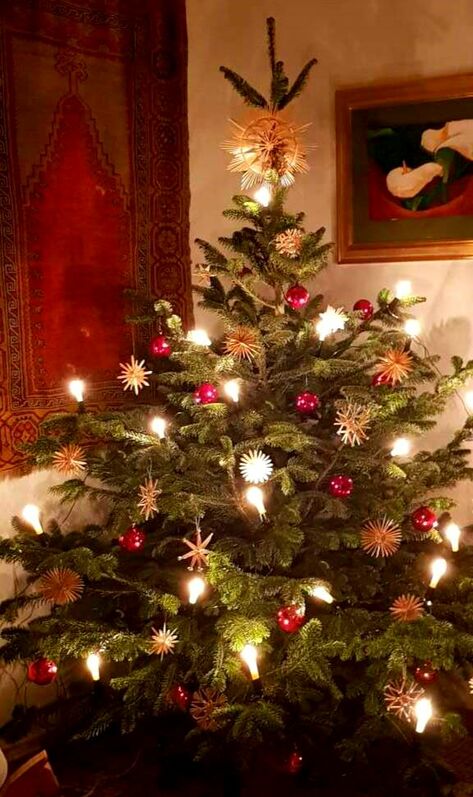
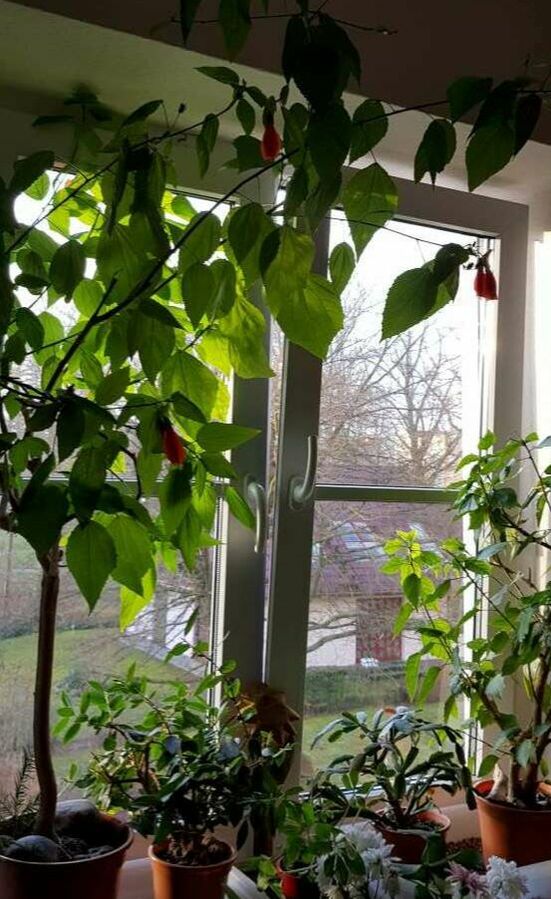
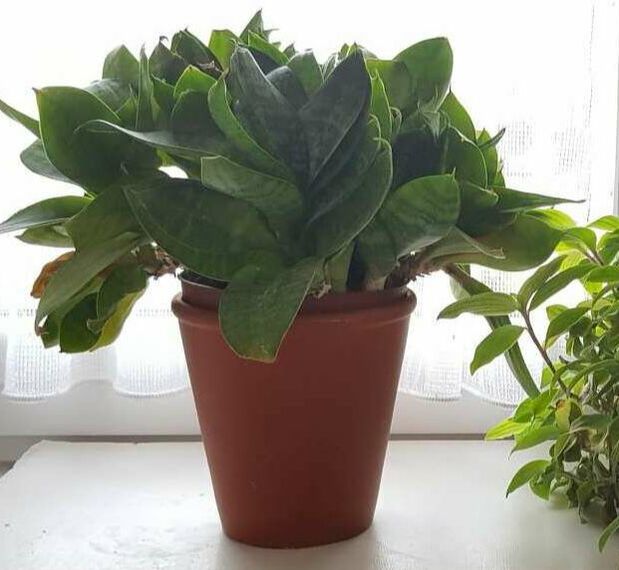
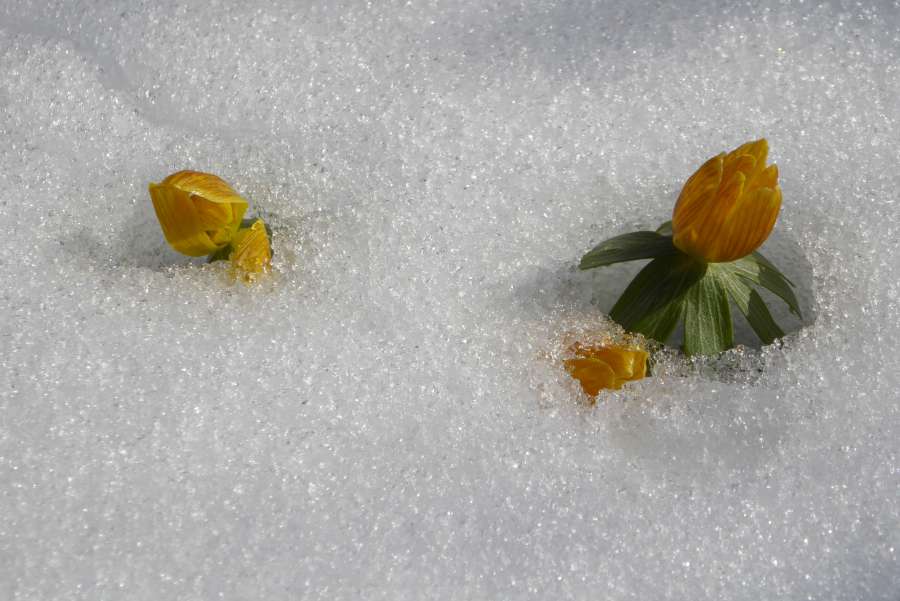
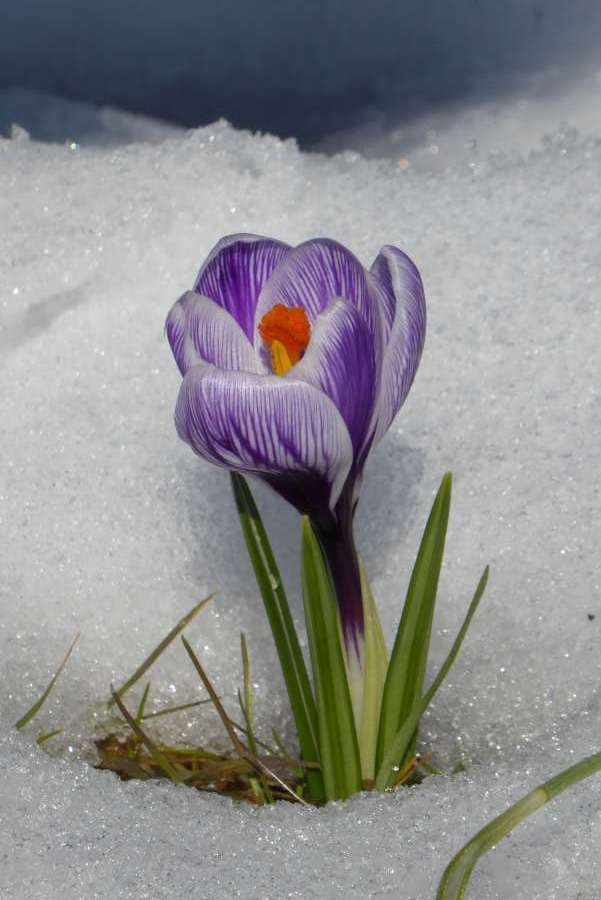
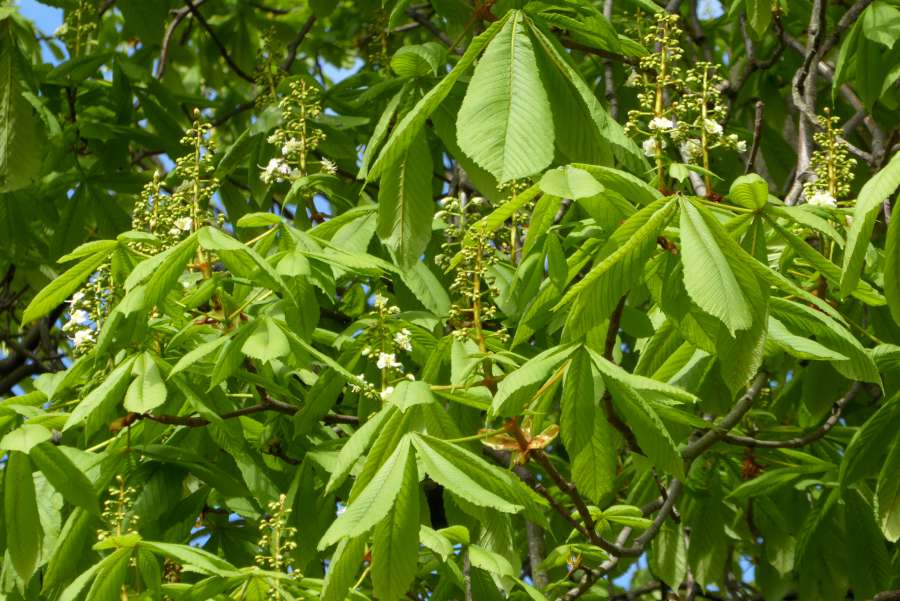
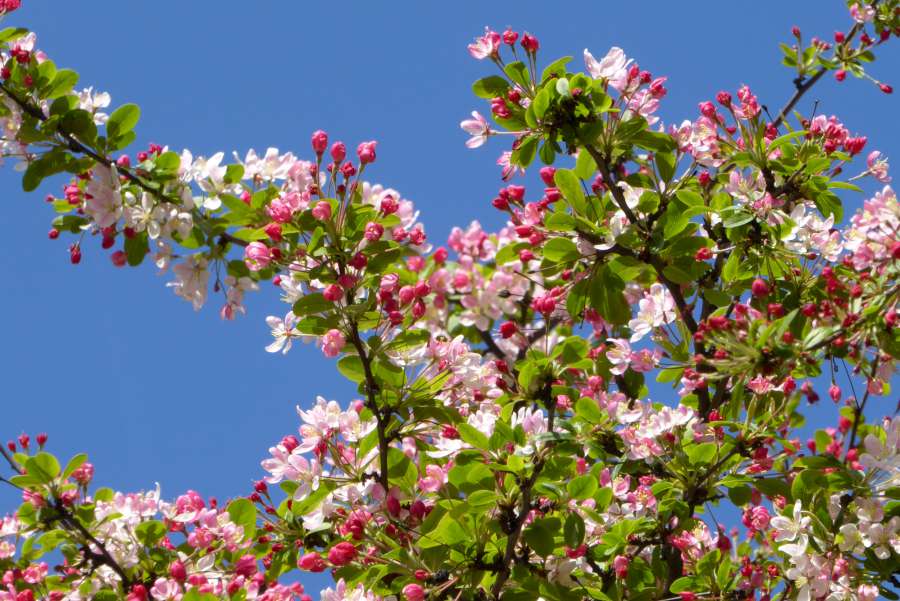
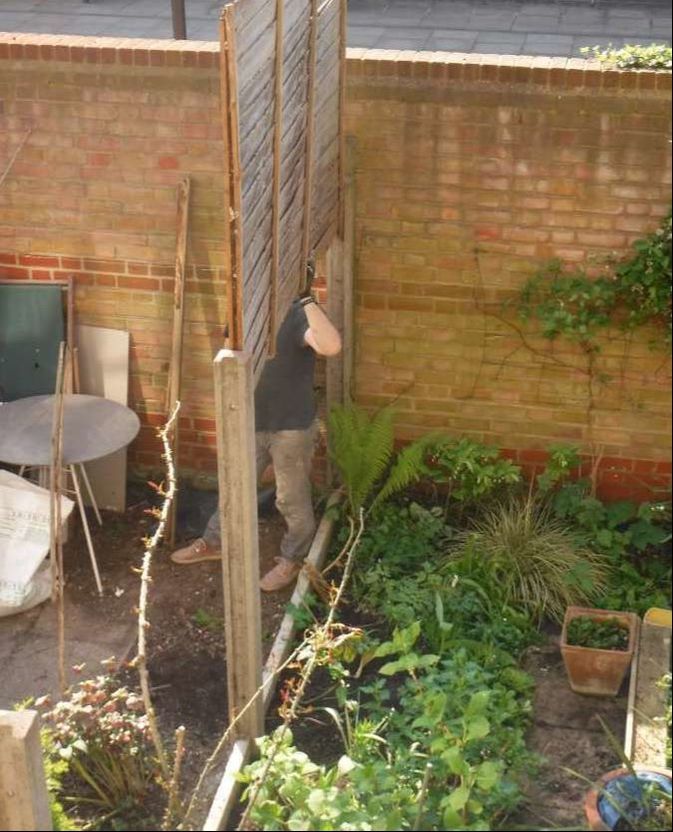
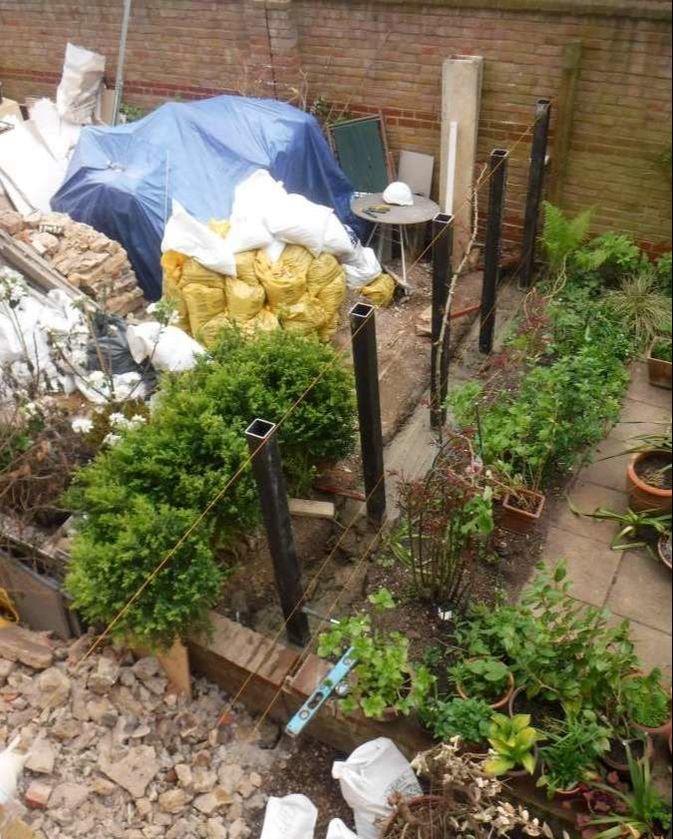
 RSS Feed
RSS Feed